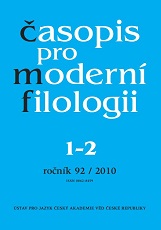Celostní filologie jako program (na příkladu baltistiky)
An encompassing approach to philology – a programme exemplified by Baltic philology
Author(s): Tomáš HoskovecSubject(s): Language and Literature Studies
Published by: AV ČR - Akademie věd České republiky - Ústav pro jazyk český
Keywords: philology; structuralism; linguistic sign; encompassing approach
Summary/Abstract: The concept of philology seems awkward and obsolete nowadays and, therefore, we cannot bring it back into use without endowing it with an explicit and positive programme. The author’s programme is a consciously structuralist one, based on the polarity between language as an abstract sign system and concrete texts (including utterances) as sign formations. Signs are studied by oppositional differentiation, which leads, when applied to the abstract system of language, to their meaning, and when applied to concrete texts, to their sense. Meaning and sense are values philology must never cease searching for, while philologists must always be aware that the abstract system of language is (i) an intellectual construction only, whereas concrete texts are real, and (ii) the key to understanding any concrete text. The different size of linguistic signs is recognized and taken into consideration: not only morphemes, but also sentences are signs. Even concrete texts themselves may at least in one aspect be conceived of as signs, for they are also studied by oppositional differentiation. Since the value of a sign depends on the definitional domain of the other signs to which it is compared, a concrete text, be it a historical document or a poetic work, is not graspable if not read oppositionally in contrast to others. Yet, definitional domains of texts do not exist by themselves as natural phenomena. They are created by philologists who are responsible for their own choices. This will be illustrated, in a further paper, by a new esquisse of historical Baltic philology.
Journal: Časopis pro moderní filologii
- Issue Year: 92/2010
- Issue No: 1+2
- Page Range: 10-17
- Page Count: 8
- Language: Czech

